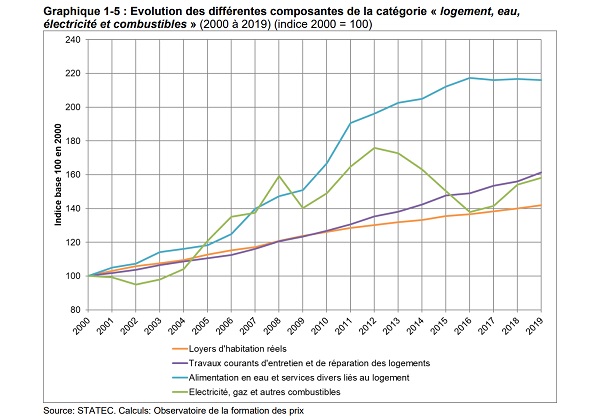 Credit: STATEC / Observatoire de la formation des prix
Credit: STATEC / Observatoire de la formation des prix
Today, Tuesday 31 March 2020, Luxembourg's Ministry of the Economy announced the publication of the Price Formation Observatory's (Observatoire de la formation des prix) half-yearly report.
Following recent developments related to COVID-19 (coronavirus) as well as the exceptional measures taken by the Luxembourg Cabinet on 12 March 2020, the "Monitoring Committee for the work carried out by the Price Formation Observatory" could not meet on Tuesday 31 March as planned. The Monitoring Committee is composed of representatives of consumers, employers' organisations and the government and is responsible for studying and discussing the analyses and reports of the Price Formation Observatory. Despite not being able to meet, committee members re-read and validated the new edition of the semi-annual report drawn up by the Price Formation Observatory, which was published today.
The new edition of this semi-annual report includes an analysis of the development of inflation in Luxembourg, a comparison of inflation with neighbouring countries and an analysis of the evolution of administered prices for the year 2019.
The report revealed that annual inflation rose slightly to 1.74% in 2019 from 1.53% in 2018, mainly due to the rise in prices for services (up 2.3%). The increase in petroleum product prices was very limited (up 0.2%) this year. Service prices, however, increased by 2.3% mainly due to the increase in prices for private and public non-compulsory education (up 9.7%), restaurants, cafes and clubs (up 2%) and childcare (up 3.9%). To a lesser extent, this rise is attributed to an increase in the price of ambulance services (up 20.8%), air transport (up 14%), driving lessons and technical control (up 10.2%) and postal services (up 7.6%). Similarly, the price of energy increased by 2.7% in 2019: while the price of heating oil fell by 2.9%, the price of electricity increased by 6.1% and that of gas by 2.7%. Fuel prices remained stable.
In addition, inflation in Luxembourg in 2019 was higher than that of the EU (1.47%), as well as that of neighbouring countries, despite the increase in excise duties on alcohol and tobacco in France and Belgium. However, the inflation rate of the Netherlands (2.68%) exceeded that of Luxembourg in particular following the increase in its VAT rate and excise duties on electricity.
The Price Formation Observatory report can be downloaded, in French, at https://odc.gouvernement.lu/fr/publications.html.








